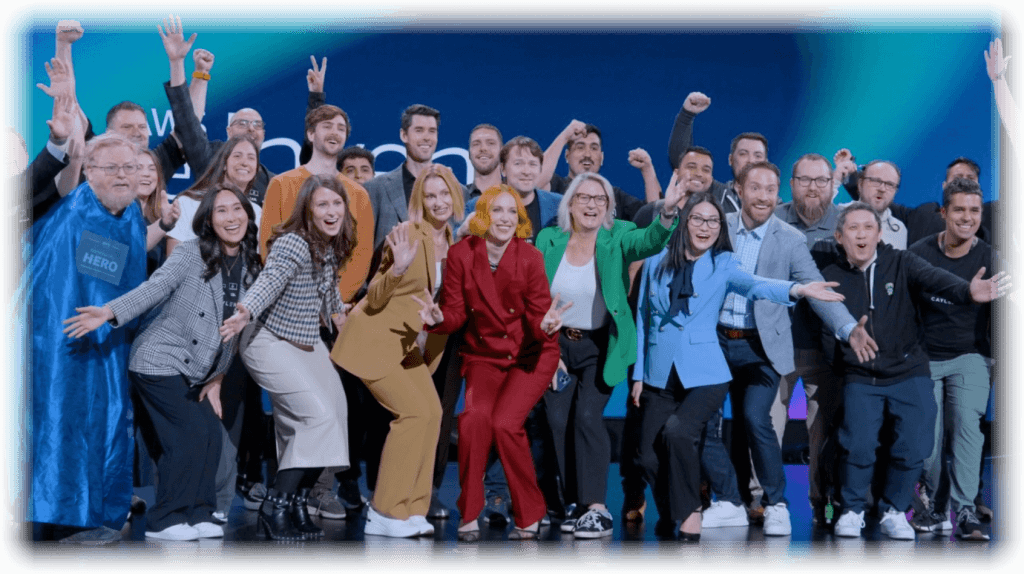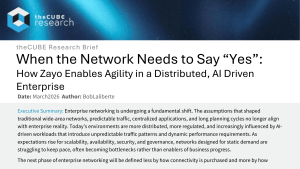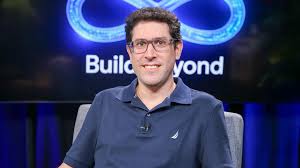
At AWS Summit 2025 in Washington, D.C., Valerie Henderson, President of Caylent, shared a compelling vision for the future of cloud and AI during her appearance on theCUBE live coverage. Speaking with theCUBE Research analysts John Furrier and Scott Hebner, Henderson outlined a roadmap for public and private sector organizations navigating a wave of digital labor transformation in the healthcare sector fueled by agentic AI. This market brief distills these insights, focusing on the foundational themes of trust, domain knowledge, and judgments that will drive a new era of digital labor.
Caylent is a premier AWS consulting partner that specializes in cloud-native AI solutions, risk and compliance, and data modernization. With deep technical expertise in AWS infrastructure and services, Caylent assists organizations in accelerating their digital transformation journeys by designing, building, and scaling cloud and AI-powered applications. The company is recognized for its innovation in applying generative and agentic AI to real-world challenges across healthcare, life sciences, manufacturing, media, and more. Caylent is a leader in helping its clients unlock new business value by merging advanced technologies with strong governance, trust frameworks, and domain-specific solutions that drive measurable outcomes.
Watch the Discussion
The Dawn of Digital Labor
Henderson characterized the current moment as a new “golden age” akin to the printing press or telephone. In her view, at this inflection point, enterprises are just beginning to grasp the implications of generative and agentic AI. Caylent, an AWS Premier Tier partner, has grown 10x over three and a half years by focusing on high-impact areas like application modernization, data engineering, and generative AI, all built on AWS infrastructure.
At the center of our conversation was how enterprises should prepare for Agentic AI, or digital labor, as it moves from concept to execution. Henderson framed the “golden age” of AI agents in healthcare as offering the opportunity to redirect human labor back to patient care. Beyond productivity gains, healthcare-trained agents promise to help healthcare workers make better goal-driven judgments across the healthcare lifecycle. The potential for better coordination between providers, greater insights, fewer errors, faster diagnoses, and highly personalized care represents a transformational improvement in our healthcare systems.
According to Henderson, enterprise adoption has moved beyond experimentation. “Everyone’s boards used to say ‘do something,” she noted, “and now we’re seeing those experiments turn into real production workloads.” Caylent’s work with clients demonstrates that agentic AI is no longer about simple chatbots but full-stack engagement layers and intelligent digital coworkers. It’s about enabling digital labor that amplifies the value of a business’s investment in human capital to achieve transformational outcomes. No Trust in Data, No Agentic AI

No Trust in Data, No Agentic AI
A recurring theme in the discussion was the importance of data privacy and regulatory readiness as critical foundational components of the healthcare industry and the linchpin for progressive agentic AI adoption. “If agents are going to be trusted to help you make critical decisions,” she emphasized, “the data they use must hold the highest degree of integrity and be explainable,” citing data privacy and compliance, particularly in healthcare, as major blockers. However, she praised AWS Bedrock for its robust security posture and guardrails, enabling clarity around hallucinations and factual integrity, allowing Caylent and its clients to focus more on delivering healthcare value.
Caylent leverages AWS Bedrock as a core foundation for building trusted generative and agentic AI solutions that meet the rigorous demands of industries like healthcare and financial services. By using Bedrock’s secure, scalable infrastructure and access to pre-trained foundation models, they can better ensure:
- Regulatory Compliance: Bedrock offers built-in support for HIPAA, HITRUST, and other key compliance frameworks, enabling Caylent to deploy AI solutions that align with healthcare regulations and safeguard patient data.
- Security and Privacy: Caylent uses Bedrock’s fine-grained identity controls, auditability, and integration with AWS security services (like IAM and CloudTrail) to maintain end-to-end data protection and traceability—critical for organizations with strict privacy requirements.
- Accuracy and Explainability: Caylent implements guardrails and evaluation pipelines using Bedrock’s tools to reduce hallucinations, assess model behavior, and provide transparency in how AI agents generate responses or make decisions.
- Domain-Specific Customization: Through Bedrock’s support for model choice and fine-tuning, Caylent enables AI agents to be tailored to highly specialized use cases (e.g., pathology diagnostics or clinical task automation), while retaining control over outputs and ensuring human oversight.
The result is a trusted agentic AI architecture that supports human-in-the-loop workflows, accelerates time-to-value, and meets enterprise-grade governance standards, turning generative and agentic AI experimentation into safe, production-ready systems.
“The thing that’s special about AWS is that within Bedrock, in terms of their level of security and compliance, it literally covers all bases. They also have guardrails that really help make sure that you have clarity on hallucinations and what is and is not factual and real.”
Additionally, Caylent has developed a structured change management approach for AI adoption, recognizing that cultural transformation is as important as technical enablement. Their methodology includes co-development, tight feedback loops, earned trust milestones, and reinforcement mechanisms. “You must train and incentivize people,” Henderson said, “and that part is often overlooked.”
Domain Knowledge is the Anchor
Henderson also stressed that the future of agentic AI lies in domain specificity. Healthcare, higher education, and manufacturing emerged as particularly ripe sectors. For instance, Caylent helped a plumbing manufacturer build a generative AI co-pilot to identify water waste, potentially saving five billion gallons annually. The ability to wrap agents around legacy systems and create interoperability between disjointed platforms unlocks enormous operational efficiency.
More domain-specific, nuanced skills are needed to do more than just make predictions or generate reports; they also need to make judgments and thus trusted decisions.
As agentic systems begin to support or even replace human judgment, valuation becomes more complex. Henderson emphasized that productivity metrics will give way to measuring the impact of better decisions. Enterprises must begin to assign value not just to speed or automation, but to improved outcomes and reduced decision fatigue. As SLAs evolve to reflect these changes, AI-driven service pricing models will shift to outcome-based frameworks.
AI agents must go beyond general-purpose capabilities and embody deep, domain-specific knowledge and nuanced operational know-how to deliver real impact in production environments. This is especially critical in healthcare, life sciences, and manufacturing sectors, where decisions depend on contextual understanding, regulatory nuances, and specialized workflows. Valerie Henderson emphasized this point:
“We are going to see a need for a deep level of domain expertise as it applies to agents… For instance, higher ed has a set of platforms that do not talk to each other, and they need to. Can you build in agents and help build a wrapper around that for a higher education firm? You absolutely can.”
As Henderson noted, the future of agentic AI lies not in generic automation but in architecting AI co-workers who deeply understand the environments in which they operate. This would enable more intelligent decisions, greater trust, and measurable ROI.
Judgments, Not Just Predictions
While generative AI has captured mainstream attention for its ability to draft text, summarize documents, and automate communication, Valerie Henderson sees a much deeper shift underway—one that agentic AI represents. According to Henderson, the true value of AI in enterprise settings, particularly in healthcare, isn’t just about productivity gains through faster content generation. It’s about judgment. Agentic AI, she notes, is designed to assist in making better decisions, especially in high-stakes environments like patient care where nuance, context, and accountability are essential.
Henderson draws a clear distinction: “Generative AI is like a football coach on the sidelines. Agentic AI is a literal quarterback that has some level of automation involved.” In this analogy, generative AI may provide guidance, but agentic AI acts on that guidance—interpreting goals, navigating constraints, and executing tasks while integrating feedback. In healthcare, that can mean everything from automatically routing clinical documentation and coordinating referrals, to helping identify patterns in imaging data that inform early diagnosis and treatment planning.
This is where Henderson believes real ROI and transformation emerge. Nurses, for example, spend nearly half their time on administrative tasks. By offloading those tasks to intelligent agents, healthcare professionals can reclaim time for patient engagement, the core reason many entered the profession. “What you can do behind the scenes with agents is incredible,” she said, adding that this shift can fundamentally change the patient experience and improve health outcomes.
Ultimately, Valerie’s perspective reinforces that agentic AI is not simply the next iteration of automation—it’s a new layer of intelligence that augments human expertise. As decision-making support becomes embedded into workflows, organizations will begin to see exponential gains—not just in operational efficiency but also in the quality and consistency of critical decisions.

AnalystANGLE
Valerie Henderson’s insights offer a rare blend of practical execution and strategic foresight. Caylent’s growth reflects a market hungry for cloud-native, secure, and trustworthy AI transformation, especially in highly regulated industries such as healthcare. Their emphasis on privacy-first infrastructure, domain expertise, and change management provides a strong blueprint for enterprises seeking to move from early-stage experimentation to scalable deployment.
In particular, Caylent’s focus on digital labor aligns with broader trends in enterprise AI: targeting labor as the largest cost center, harnessing nuanced domain knowledge, and building interoperable systems. Their embrace of AWS tools like Bedrock and SageMaker reflects a commitment to flexible, modular architectures capable of evolving with rapid model and agent advancements.
As digital labor systems mature, Caylent’s approach demonstrates how agentic AI can deliver operational transformation—if enterprises begin with trust, accountability, and strong data foundations.
Watch all the coverage of the AWS DC Summit here:
https://www.thecube.net/events/aws/aws-summit-washington-dc-2025





